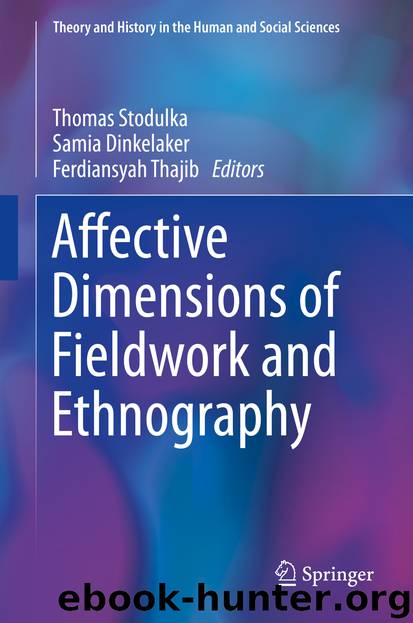Affective Dimensions of Fieldwork and Ethnography by Thomas Stodulka & Samia Dinkelaker & Ferdiansyah Thajib

Author:Thomas Stodulka & Samia Dinkelaker & Ferdiansyah Thajib
Language: eng
Format: epub
ISBN: 9783030208318
Publisher: Springer International Publishing
Increasing Emotional Involvement
Being an individual researcher may increase the role of emotions in the field. In my case, my degree of emotional involvement13 was considerably higher when I was alone in the field. It was during my time without my family that I started to really love some people I was researching with and started to feel deep empathy for them. This strong emotional sensitivity enriched my perception in the field. Led by emotions I was able to identify very small details and, on the other side of the coin, I was also more prone to construct fitting details.
Many of my emotional notes, from my stay without my family, circled around interpersonal relations: Did I act the right way? Did the other person consider me arrogant in that situation? Why was he so brusque toward me? Should I have been visiting them earlier? These reflections are very detailed and go hand in hand with very detailed observations that contribute to the quality of research. Everything that others did seemed so important. What I often did not consider was that, in many cases, it was probably just me who put importance into a certain interaction or relation. When emotions occurred, I never thought to myself: “Anyway, this is just an issue at work. Soon it will be the weekend,” or “Anyway, this is just this person’s private opinion; it’s not related to my research.” On the other hand, the person my thoughts were concerned with might have done exactly that. They might have had something emotionally and practically more important to do than reflecting on their relation to a researcher. As an ethnographer without genuine care relations in the field, I think I somehow tended to overestimate my relations to others.
Interestingly, many of my strong feelings were connected to something that was missing in my life in the field: children and a loving family.14 Probably, my strongest emotional experience was when I felt that children I knew well were being treated unfairly by a teacher at their school. Also, I developed a strong emotional attachment to certain elderly women. As is customary in the Philippines, I called them nanay, meaning “mother,” and I conceptualized them as strong, politically active, full of love, organized, and socially and technically skilled. In short, I saw them as mothers and enjoyed being temporarily attached to them as a daughter would have been.
Download
This site does not store any files on its server. We only index and link to content provided by other sites. Please contact the content providers to delete copyright contents if any and email us, we'll remove relevant links or contents immediately.
Should I Stay or Should I Go? by Ramani Durvasula(7669)
Why We Sleep: Unlocking the Power of Sleep and Dreams by Matthew Walker(6726)
Fear by Osho(4740)
Flow by Mihaly Csikszentmihalyi(4698)
Rising Strong by Brene Brown(4463)
Why We Sleep by Matthew Walker(4447)
The Hacking of the American Mind by Robert H. Lustig(4383)
How to Change Your Mind by Michael Pollan(4357)
Too Much and Not the Mood by Durga Chew-Bose(4348)
Lost Connections by Johann Hari(4188)
He's Just Not That Into You by Greg Behrendt & Liz Tuccillo(3900)
Evolve Your Brain by Joe Dispenza(3679)
The Courage to Be Disliked by Ichiro Kishimi & Fumitake Koga(3504)
Crazy Is My Superpower by A.J. Mendez Brooks(3401)
In Cold Blood by Truman Capote(3386)
Resisting Happiness by Matthew Kelly(3341)
What If This Were Enough? by Heather Havrilesky(3311)
The Book of Human Emotions by Tiffany Watt Smith(3309)
Descartes' Error by Antonio Damasio(3279)
